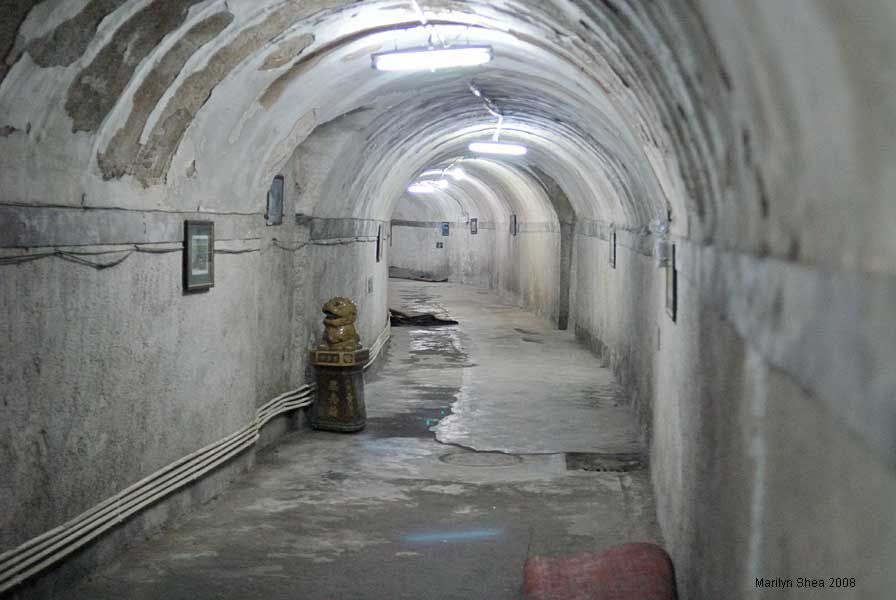|
Holes in the Ground and the Russian Language
Traffic accidents in Beijing included, of late, bikes and even cars being trapped in large holes that appeared suddenly in different sections of the city’s roads. These were attributed to overdrawing of the underground water as well as the building of the city’s subway. Do some of these have something to do with the Underground City? I’m not sure. I know nothing of how it was dug since I was then digging my own assigned portion of a tunnel in Harbin, 50 yards in front of the “Small Yellow House” where some 40 employees (from cooks to professors) of the Harbin Teachers’ College lived with their families.
Tunnel-digging was started all of a sudden under the slogan of “Dig deep the tunnels, keep vast the stores of grain, and never seek hegemony” (深挖洞,广积粮,不称霸)—a CPC strategy formed after a piece of ancient wisdom advising “Build high your walls, keep vast your stores of grain, and never take the royal title” (高筑墙,广积粮,不称王) . How deep should the tunnel be? The official instruction was seven meters—a layer of soil that thick was said to be sufficient to sustain the attack by an atomic bomb. Whose bomb? Russian or American, either. Did we, the ones made to take turns digging, night and day, believe in any of these instructions? I am not sure, since nobody cared to talk even if quite a few could have been skeptical –by that time little credit was left of the authorities, so that people tended rather to believe or imagine the opposite of what they said. A common way of life.
It was during these long hours in the dark tunnel seven meters underground that I translated into English the following rhyme: 龙生龙,凤生凤,耗子养儿会打洞——
“Dragons beget dragon, Phoenix beget phoenix; when two rats beget a son, holes in the ground he digs.” This was the rhyme the young Beijing worker Yu Yueke 遇乐克 (Yù Yuèkè) died to disagree and repudiate when the Cultural Revolution was first announced and launched. My translation was done to keep my mind occupied and, as I saw it, because it was so very descriptive of the situation: while his majesty the dragon king and his phoenix lady—the red capital empress—rule and enjoy their power on high, we the rats and mice and moles have to dig and dig.
When did the schools switch to English?
This is a long story.
Actually, the shift began in the mid-50s because of the painful realization that in the field of natural science and technology there was not much information to be gained from any of the documents that were available in the Russian language. While English was admittedly the imperialist language, it was the imperialists who knew how to make guns and gunboats (now the bomb and the missile). And so English-teaching, which had been pushed to the side tracks since 1949 was tentatively restored in the colleges. This was behind my transfer in late 1955, from a middle school where I was teaching Chinese, to teach English at the Harbin Teachers’ College, where an English Teaching Group was quietly set up. Thus the change—small and slow—had nothing to do with politics.
It was in early 1956 that something rather drastic occurred: students of two classes of the Russian Department, HTC, about 40 in total, were ordered to switch majors. To make up for their loss, these young people were allowed to choose any other subject from among all the departments and specialties of the academy, but they must give up their study of Russian because, it was announced, the Harbin Institute of Foreign Languages had over-recruited their Russian students the year before. The logic, even if the facts had been true, was rather weird: if it was the Foreign Language Institute that had over-recruited, then it should be their Russian classes that were cut, not ours. Isn’t this, I said, citing the event, when being solicited for criticism to help the Party rectify its work style, treating the foot when it was the head that was aching? (头痛医脚) The wise crack, fashioned after the saying “Treat the head when the head aches, and the foot when the foot hurts” satirizing a palliative approach to one’s illness, almost made me a Rightist the year after.
Why such a sudden cut for Russian learning? We were told that the Soviet Union had turned into our bitter enemy, but that was much later.
English teaching was formally reinstated in 1964 when Zhou Enlai ordered 17 foreign languages institutes (mainly English ones) be set up at about the same time throughout the country, and I was transferred to the one set up in Harbin. The original Harbin Institute of Foreign Languages had, at this time, been integrated into the Heilongjiang University, we inherited its name. Two years later we had the Cultural Revolution when nobody studied anymore, be it English, Russian, or Chinese.
—冯世则 Feng Shize (Féng Shìzé)
August 2008
|
